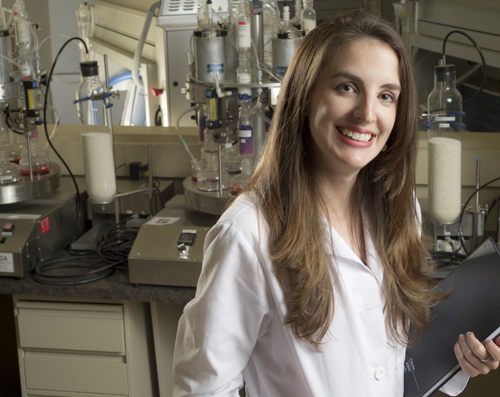Story by Katy Jonker, a member of the SPARK program (Students Promoting Awareness of Research Knowledge)

With non-renewable petroleum-based resources destined to deplete, global concerns rising over climate change, and plastic waste escalating to more than 200 million tons annually in North America, demand is high for alternative types of sustainable packaging materials. Guelph graduate Sara Bonham is answering the call for greener materials.
A food science and agricultural chemistry graduate with a master’s degree in biological engineering, Bonham is working as a research and development associate with Polymer Specialties International Ltd. (PSI) at its state-of-the-art laboratory, pilot plant and manufacturing facilities in Newmarket, Ont. There, she researches new bioplastics, biocomposites and petro-based plastic blends, and assists multinational companies with scale-up trials for commercialization.
Bonham credits her Guelph degrees and the Highly Qualified Personnel (HQP) Scholarship Program offered by the Partnership Agreement with the Ontario Ministry of Agriculture and Food, and the Ministry of Rural Affairs for helping her get to this point. “The HQP program was a really great resource for me, and I would recommend anyone complete their graduate studies at Guelph. It provided me with relevant real-world experience as well as the tools I needed to transfer my skills to the industry with credibility.”
Each year since 2009, the HQP program has provided about 25 Guelph graduate students with opportunities to complete their research while learning to network and improve their business skills. This, in turn, gives employers a crop of experienced and qualified students to choose from.
Bonham says the coursework associated with the HQP course “Integration of Science and Business,” allowed her to gain an entrepreneurial perspective on marketing her research and identifying needs in the industry.
While completing her master’s degree and HQP coursework, she found that the food and automotive industries lacked cost-effective, compostable packaging films produced from non-petroleum-based resources. Further studies revealed that products such as plastic water bottles, yogurt packaging, plastic to protect fresh food, and even steering wheel covers and car seat material could be made more sustainably.
During her master’s studies, Bonham worked with engineering and plant agriculture professors Manju Misra and Amar Mohanty to create cost-competitive sustainable packaging for the food and automotive industries using agricultural residues from crops such as soybeans.
Bonham then applied her lab work to an industry setting during a four-month work term as a packaging engineer intern at General Mills. While there, she looked for ways to reduce the costs of bioproducts while improving their quality.
This internship, as well as the HQP program, allowed Bonham to tie her research and experience together, which led to her current job at PSI. She says her goal is to continue developing sustainable biomaterials that will be widely embraced and used in the marketplace and the general public.
The HQP Scholarship Program is funded through the Partnership Agreement with the Ontario Ministry of Agriculture and Food, and the Ministry of Rural Affairs. Bonham’s U of G research was also funded by the Hannam Soybean Utilization Fund.